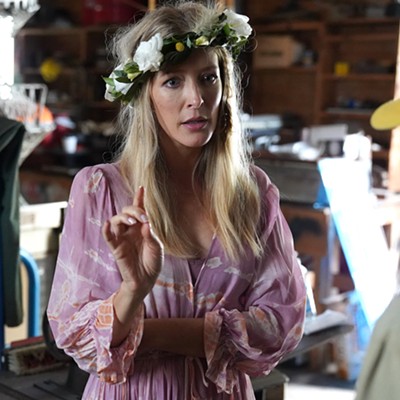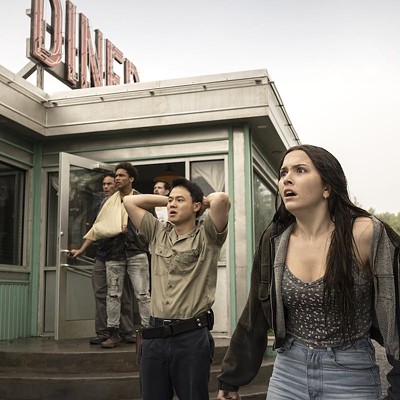A screen preface informs us that Tristan and Isolde is set in The Dark Ages. That’s appropriate for a movie whose colour scheme runs the gamut from grey to brown. The glum visuals are a near opposite of the spectacle and sweeping camera movements that have come to characterize movie epics. It’s possible this may be intended as an exotic landscape. To me, it looks like rural Nova Scotia. When English Tristan (James Franco) is wrongly assumed to be dead, his body is put to sea. Washing ashore in Ireland, he’s discovered by Isolde (Sophia Myles), the daughter of a king. Their love becomes a secret shame. In the hands of Kevin Reynolds, it’s an affair that’s suppression is mirrored in his disinterest for the surrounding story. Reynolds can be an underrated action filmmaker — Waterworld and The Count of Monte Cristo bring more clarity and excitement to the theme of the price of freedom. This time, the film is at its least involved during the big battles. Myles and Franco’s charisma is crushed under the weighty corn of their dialogue. “Am I not permitted a moment without mourning?” Isolde asks. “I live in torment thinking of these moments,” is Tristan’s barely comprehensible reply. When Isolde later demands, “Why does loving you feel so wrong?” it sounds like the chorus to a pop song. But Tristan and Isolde never connects as a work of pop passion.
Mrs. Henderson Presents
Nudity is seen as an innocuous distraction from violence in Mrs. Henderson Presents. That’s fair enough, but it also imbues the film with a false sense of edginess. Using the real story of West End London’s Windmill Theatre, which incorporated nude girls in its stage show, a mannered comedy bears its sole distinction through attempted shocks. The World War II-era venue is founded by aristocrat Laura Henderson (Judi Dench), with production handled by Vivian Van Damm (Bob Hoskins). The film, directed by Stephen Frears, finds something inherently funny about a liberal senior woman. Dench gets to comment on the performers’ naked figures and curse a little, and we’re expected to thrill to the sinful delight. Key history, such as Henderson taking inspiration for The Windmill Theatre from the Moulin Rouge, is skimped over. In fairness, good movies are less about feeding us factual tidbits on a subject than connecting us to them emotionally, artistically. The larger message of Mrs. Henderson Presents doesn’t register honestly. It professes that nudity isn’t an enemy, yet keeps treating it as a naughty joke.
Glory Road
This year’s mandatory coach movie takes one notable break from the formula: the coach isn’t a complete sociopath who earns his players’ love by treating them like dirt. What’s left in the college basketball drama Glory Road are the basics of inspiration and sportsmanship. And it plays it well. You know from the title that it’s either a victorious war movie, a victorious Depression-era movie or a victorious sports movie. It uses the historic event of the recruitment of black basketball players for the white college Texas Western Miners team. Set in 1965, when segregation is such that a student can remark that he’s never previously seen a black person, Coach Don Haskins (Josh Lucas) takes it upon himself to reinvent the always-losing Western Miners. Despite small touches, like a player pointing to a Black Panthers poster, the social climate isn’t expanded on far beyond the walls of the school system. It’s a less lavish variation of producer Jerry Bruckheimer’s own Remember the Titans, with school melodrama competing with sports action. No character revelation or training montage is spared. But its message still hits hard because it’s articulated so directly. Glory Road is an esteemed example of this melding of social inclusiveness with sport story victory. It’s cliched but sincere — as articulate and agreeable as the coach at its centre.
Articulate, (Dis?)agreeable: [email protected]














